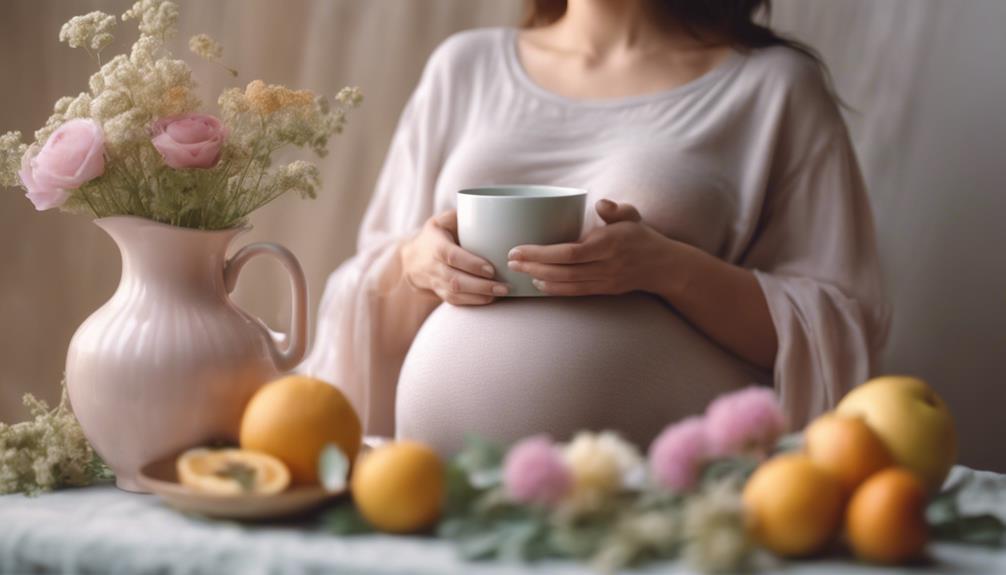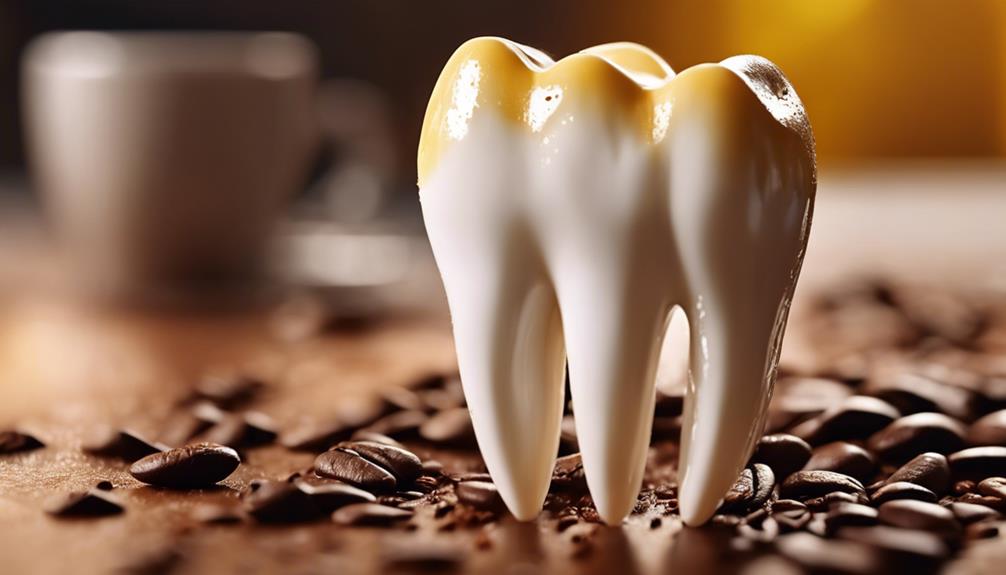Drinking excessive amounts of caffeine while pregnant can lead to significant issues such as an elevated risk of miscarriage, restricted fetal growth, and low birth weight. Consuming too much caffeine, typically exceeding 200mg per day, can impede the delivery of oxygen and nutrients to your baby, impacting its development. You may also experience worsened symptoms of insomnia, morning sickness, and increased heart rate. Coffee, tea, energy drinks, and chocolate are all common sources of caffeine. It is essential to monitor your consumption and adhere to recommended limits for a healthy pregnancy. For more information on managing caffeine intake during pregnancy, please refer to the following link. Understanding the potential effects of coffee consumption on your pregnancy is crucial. Some studies suggest that high caffeine levels could heighten the risk of preterm birth and stillbirth. Additionally, caffeine can pass through the placenta to the baby, leading to possible irritability and sleep disturbances post-birth. It is advisable to seek personalized guidance from your healthcare provider on managing caffeine intake during pregnancy.
Key Takeaways
- Excessive caffeine intake during pregnancy can increase the risk of miscarriage.
- High caffeine levels can lead to low birth weight and fetal growth restriction.
- Elevated caffeine can interfere with fetal development and oxygen flow.
- Babies exposed to high caffeine levels may face developmental issues.
- Pregnant women consuming too much caffeine may experience insomnia, increased heart rate, and digestive issues.
Risks of Excessive Caffeine
Consuming more than 200mg of caffeine daily during pregnancy can increase the risk of miscarriage. It's essential to recognize that caffeine isn't just in coffee; it's also hidden in products like chocolate and energy drinks. This means your overall intake can quickly add up without you realizing it.
When you're pregnant, excessive caffeine intake poses several risks. One significant concern is the increased likelihood of miscarriage. Studies have shown that elevated caffeine levels can interfere with fetal development, leading to this unfortunate outcome.
Moreover, high caffeine consumption can result in low birth weight for your baby. Low birth weight is a serious condition that can lead to various health challenges for your newborn, including respiratory issues and developmental delays.
Another critical risk is fetal growth restriction. When you consume too much caffeine, it can limit the blood flow to the placenta, reducing the amount of oxygen and nutrients your baby receives. This restriction can hinder your baby's growth, leading to long-term health implications.
To minimize these risks, it's advised to monitor and limit your caffeine intake carefully during pregnancy, ensuring a healthier environment for your developing baby.
Safe Caffeine Intake

To promote a healthy pregnancy, it's vital to comprehend and follow the recommended maximum daily caffeine intake of 200mg. The Department of Health advises pregnant women to limit their caffeine intake during pregnancy to this amount to avoid potential complications. The amount of caffeine you consume depends on various factors, including your sensitivity to caffeine, which can be heightened during pregnancy. Consuming more than the recommended amount can worsen pregnancy symptoms such as insomnia and morning sickness.
Here's a helpful table to visualize the safe caffeine intake:
| Beverage Type | Approx. Amount (mg) | Serving Size |
|---|---|---|
| Brewed Coffee | 95 mg | 8 oz |
| Black Tea | 47 mg | 8 oz |
| Cola Drink | 33 mg | 12 oz |
It's important to monitor the mg of caffeine per serving in your diet. Some women are more sensitive to caffeine and may need to reduce their intake even further. Excessive caffeine consumption can lead to increased urination and bladder irritation, adding to the discomforts of pregnancy. By adhering to the Department of Health's guidelines, you can help guarantee a safer, healthier pregnancy.
Caffeine Content in Common Drinks

Understanding the caffeine content in common beverages is essential for managing your intake during pregnancy. Knowing how much caffeine is in your favorite drinks can help you make informed choices to avoid excessive consumption.
An 8 oz cup of coffee typically contains 100-150 mg of caffeine. If you drink multiple cups a day, you could quickly surpass safe limits.
Tea is another common source of caffeine. An 8 oz serving of tea contains around 30-50 mg of caffeine, which can add up if you enjoy several cups daily.
Energy drinks often have a higher caffeine content, with some brands containing up to 300 mg per serving. These are particularly concerning during pregnancy due to their high caffeine levels.
Soft drinks like cola can also contribute to your caffeine intake, with a 12 oz can containing about 30-50 mg of caffeine.
Even chocolate isn't free from caffeine. A 1 oz bar of dark chocolate contains approximately 20 mg of caffeine, which can contribute to your overall intake if you indulge frequently.
Effects on Fetal Development

Knowing how much caffeine your favorite beverages contain is just the first step; it's crucial to understand how excessive caffeine intake can affect your baby's development. High levels of caffeine can pass through the placenta to your baby, potentially leading to several complications.
One significant issue is fetal development. When you consume too much caffeine, it can restrict the growth of your baby, resulting in low birth weight and making them small for their gestational age.
Additionally, high caffeine intake has been linked to an increased risk of miscarriage. Since your baby's metabolism is still developing, they can't process caffeine as efficiently as you can. This inefficiency may lead to adverse outcomes, including stunted growth and developmental issues.
To minimize these risks, it's crucial to limit caffeine intake to under 200mg per day.
Miscarriage and Low Birth Weight

High caffeine intake during pregnancy greatly increases the risk of miscarriage and can result in low birth weight for your baby. When you consume excessive caffeine, it crosses the placenta and affects fetal development. This exposure can lead to fetal growth restriction, a condition where the baby doesn't grow as expected in the womb. Studies indicate that consuming over 200mg of caffeine daily is linked to these adverse outcomes.
The potential pregnancy risks associated with high caffeine intake include:
- Miscarriage: Elevated caffeine levels can increase the likelihood of losing the pregnancy, particularly in the early stages.
- Low Birth Weight: Babies exposed to high levels of caffeine in utero are more likely to be born with a weight below 5 pounds, 8 ounces.
- Stillbirth: Although less common, excessive caffeine consumption has been connected to an increased risk of stillbirth.
These risks underscore the importance of monitoring your caffeine intake during pregnancy. By keeping your caffeine consumption within recommended limits, you can help ensure a healthier pregnancy and reduce the likelihood of complications. It's always best to consult with your healthcare provider to determine the safest amount of caffeine for you and your baby.
Monitoring Your Caffeine Consumption
Monitoring your caffeine consumption during pregnancy is crucial, ensuring that your daily intake stays below 200mg to mitigate risks.
Pay attention to all sources of caffeine, such as coffee, tea, chocolate, and energy drinks, as they can collectively exceed safe limits.
Opting for safe beverage options, like herbal teas or decaffeinated drinks, can help you maintain a healthy balance.
Daily Caffeine Limits
To ensure a healthy pregnancy, keep your daily caffeine intake under 200 milligrams. For pregnant women, monitoring caffeine consumption is essential as it can greatly impact both maternal and fetal health. Consuming more than 200 milligrams of caffeine per day can increase the risk of low birth weight, which is linked to numerous health complications for the newborn. Staying within this limit minimizes potential risks, including miscarriage, stillbirth, and other adverse outcomes.
Here's why you should be cautious about your daily caffeine intake:
- Health Risks: Exceeding 200 milligrams of caffeine can lead to serious health issues like low birth weight and developmental problems.
- Heightened Sensitivity: Pregnant women often experience increased sensitivity to caffeine, causing jitters, anxiety, and worsening pregnancy symptoms like insomnia and morning sickness.
- Monitoring Consumption: Keeping track of your caffeine intake helps you stay within safe limits, ensuring you and your baby remain healthy throughout the pregnancy.
Safe Beverage Choices
Selecting safe beverages during pregnancy is crucial for maintaining your caffeine intake within recommended limits. Monitoring your caffeine consumption helps you avoid risks such as miscarriage, low birth weight, and fetal growth restriction. To keep your intake within the advised daily limit of 200mg, choose beverages like decaffeinated coffee, herbal teas, fruit juice, and water. These options allow you to enjoy a variety of drinks without exceeding safe caffeine levels.
Decaffeinated coffee offers the familiar taste of regular coffee minus the high caffeine content. Herbal teas are another excellent choice, but make sure they're free from ingredients that mightn't be safe during pregnancy. Fruit juice and water not only hydrate but also provide essential vitamins and nutrients.
Be mindful of hidden sources of caffeine in products like chocolate, energy drinks, and some medications. These can inadvertently increase your daily caffeine intake. Always read labels carefully and consult your healthcare provider if you're uncertain about specific items.
Alternatives to Caffeine

Switching from caffeine to herbal teas, fruit juice, milk, or unsweetened soft drinks can provide you with invigorating and caffeine-free alternatives during pregnancy. These options help in reducing your caffeine intake without sacrificing taste or variety. Incorporating caffeine alternatives into your diet can mitigate potential risks associated with high caffeine consumption while pregnant.
When cutting back on caffeine, it's essential to seek personalized advice from your maternity care provider to make sure that your choices support both your health and that of your baby.
Herbal teas, made from a variety of plants, can offer you different flavors and potential health benefits. Fruit juice, especially when freshly squeezed or free from added sugars, is a renewing way to stay hydrated and enjoy natural sweetness. Milk not only provides essential nutrients like calcium and protein but is also a comforting beverage that can replace your usual caffeinated drinks.
- Herbal teas: Chamomile, peppermint, and rooibos are popular caffeine-free options.
- Fruit juice: Opt for 100% fruit juice with no added sugars.
- Milk: A nutritious choice that can be enjoyed warm or cold.
Discussing these changes with your GP or maternity care provider can help you develop a safe and effective caffeine reduction strategy.
Expert Recommendations

When it comes to managing caffeine intake during pregnancy, experts recommend keeping it under 200 mg per day to minimize risks to both you and your baby. Following this guideline can help reduce the chances of low birth weight, preterm birth, and babies being small for their gestational age. Organizations like the FSA emphasize that keeping your caffeine per day within this limit promotes Child Health and aids in investigating the causes of pregnancy complications.
To visualize what 200 mg of caffeine looks like, consider the following table:
| Beverage/Food | Serving Size | Approximate Caffeine Content (mg) |
|---|---|---|
| Brewed Coffee | 8 oz (240 ml) | 95 |
| Black Tea | 8 oz (240 ml) | 47 |
| Energy Drink | 8.4 oz (250 ml) | 80 |
| Dark Chocolate | 1 oz (28 g) | 12 |
| Soda | 12 oz (355 ml) | 30 |
Being mindful of hidden caffeine sources like chocolate and energy drinks is important. Even before conception, couples are advised to restrict caffeine intake to mitigate potential risks. By following these expert recommendations, you can contribute to a healthier pregnancy and better outcomes for your baby.
Frequently Asked Questions
What if I Accidentally Had Too Much Caffeine While Pregnant?
If you accidentally consumed too much caffeine while pregnant, don't panic. Monitor your intake moving forward to avoid exceeding 200mg per day, which is considered the safe limit.
Be mindful of the caffeine content in common items like coffee, tea, and chocolate. Consult your healthcare provider for personalized advice, and utilize resources like caffeine calculators to help manage your intake.
Taking these steps can mitigate potential risks.
How Does Caffeine Affect an Unborn Baby?
Imagine caffeine as a tiny intruder crossing the placenta, directly impacting your unborn baby's heart rate and metabolism.
High caffeine levels can lead to complications like low birth weight, difficulty in regulating sleep-wake cycles, and potential long-term developmental issues.
Therefore, it's essential to monitor your intake, ensuring your baby's health and minimizing risks associated with excessive caffeine consumption during pregnancy.
How Much Caffeine Is Too Much When Pregnant?
When you're pregnant, consuming over 200mg of caffeine daily is seen as vital. This includes not only coffee but also hidden sources like chocolate and energy drinks.
To avoid the risks of miscarriage, low birth weight, and fetal growth restriction, it's important to monitor your intake. Using tools like a caffeine calculator can help you stay within safe limits, ensuring a healthier pregnancy.
How Much Caffeine Is High Risk Pregnancy?
When considering how much caffeine is high risk during pregnancy, it's important to know that consuming over 200mg daily is deemed high risk. This amount is linked to an increased likelihood of miscarriage, fetal growth restriction, and low birth weight. Keeping your caffeine intake below this threshold is recommended for the health of both the mother and the developing fetus.
Be mindful of hidden caffeine in food and drinks.
Conclusion
In summary, consuming too much caffeine during pregnancy can pose significant risks, including potential impacts on fetal development, increased chances of miscarriage, and low birth weight.
It's important to monitor your caffeine intake and stay within recommended limits to guarantee a healthy pregnancy. You can explore caffeine-free alternatives to maintain your energy levels.
Remember, the health of your baby is paramount, so it's vital to make informed decisions and consult with healthcare professionals for personalized advice.









